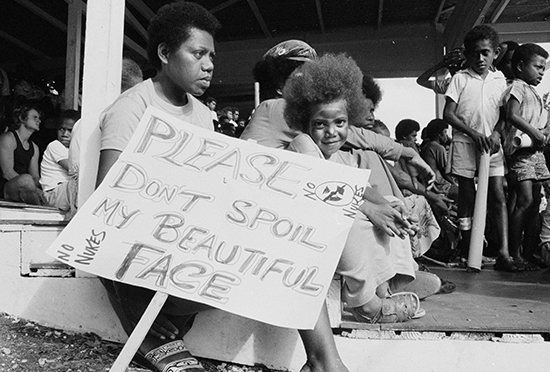
SUVA (Wansolwara / Pacific Media Watch): REVIEW: Don’t Spoil My Beautiful Face: Media, Mayhem and Human Rights in the Pacific is being published today while Fiji is voicing the mantra of the free press at the same time as it continues to ban experienced Pacific reporters such as Barbara Dreaver and Michael Field from New Zealand and Sean Dorney of the ABC.
Ashwin Raj, chairman of the new Media Industry Development Authority (MIDA) is haranguing journalists at public media meetings using expressions such as “…the complicity of select Fijian journalists and media either wittingly or those that remain oblivious to the laws of Fiji…”
The same MIDA that is so upset with Sean Dorney’s mild comment that“ there was a feeling in the room anyway that the situation in Fiji wasn’t as free and open for the media as it should be” is also asking for “an ethos of robust debate".
MIDA might strengthen its interpretation of robustness by reading Dr David Robie’s arguments for improving journalism education rather than putting media training on hold.
Robie has been concerned with the quality of Pacific journalism training for many years. He looks beyond conflict reporting and quotes Kunda Dixit, editor–in-chief of the Nepali Times, who has little love for counterpoint in journalism stories that foster the tension and drama of controversy making most reportage “sound like a quarrel” in a way that obscures rather than increases clarity about global problems.
Robie writes on “deliberative journalism” which he says includes peace journalism, development journalism and human rights journalism. He tries to nail down his own interpretation, which is “critical development journalism”, by saying it goes beyond the standard reportage model to get into the gutsy questions of “how, why” and “what now”.
His views are parallel with an Asian-Australian academic, Asia-Pacific Media Educator editor Dr Eric Loo, who recently tried to “rescue” the journalism school at the University of Papua New Guinea, and who criticises a “biased” view by Western journalists of a journalism model that stresses successful social and economic development, instead of the conventional focus on conflict, such as failed government projects and their policies.
Important issues
While Robie struggles, perhaps inconclusively, to get precision into the terminology of the many forms of journalism, he is clear on the need for journalists to continue to strengthen their skills in order to scrutinise the institutions of governance affecting many peoples of the Pacific. He notes the diaspora of Pacific people migrating and settling in Australia, New Zealand and North America. These migrants, some of whom are now second and third generations, look to journalists to inform them on important Pacific issues other than disasters.
Writing quality journalism while dealing with cultural and tribal pressure is a problem identified by Robie. He notes that former Fiji Daily Post editor Jale Moala says about the Speight Coup of 2000 that customary obligations are a burden, that it:
“…was not so much one of reporters taking sides, as it may have seemed at the time, but the inability of many reporters to function objectively under the pressures of the crisis. A lack of leadership in newsrooms was one reason. One media organisation that came under early criticism was the state-owned Radio Fiji, which seemed to suffer from a combination of confusion over who was in power or who was going to end up in power, and lack of newsroom discipline and leadership...”
Robie worked in Papua New Guinea for a number of years and frequently wrote about Bougainville. He went to Kieta to report on the new war and stayed in a hotel where soldiers sat eating their dinners with their guns on their laps. This is a colorful chapter, full of detail with Robie at the heart of the conflict and reporting it.
New Zealand consultants had come up with a report saying the mining company was causing huge environmental damage. Robie published a series of articles on Bougainville and then as head of the journalism programme at the University of Papua New Guinea he got his students to cover the conflict. This rich chapter probes a nasty part of Pacific history.
A lesser-known conflict for Pacific readers was the 1989 struggle by Canadian Indians of the Lubicon Lake Nation with their call for sovereign rights on traditional hunting and trapping. Robie draws parallels between the struggle of the Indian tribes and the New Zealand Ngati Whatua’s occupation of ancestral land in Auckland, which was ended by a police and army raid after a peaceful occupation of 507 days.
Robie neatly updates the Canadian story with one of the leading protagonists who says the original conflict continues and it is now in the hands of the courts.
Painful stories
The book has photographs that reflect faces of families embroiled in the numerous conflicts, the plump faces of their leaders and lean soldiers toting guns. Painful stories from Tahiti, Tonga, Timor-Leste, Fiji, the Philippines and other parts of the disturbed Pacific help to make this book an important part of our Pacific history .
Robie says this book may be seen as a sequel to two earlier volumes, Blood on the Banner: Nationalist Struggles in the South Pacific and Tu Galala: Social Change in the Pacific. Investigative journalist John Pilger describes it as an “extraordinary secret history”.
Don’t Spoil My Beautiful Face, with its overview of various conflicts, needs to be added to the shelves of Pacific newsrooms and journalism schools. It would make a valuable addition to the shelves of numerous politicians who provided the author with considerable content for this book and who are now feeding him material for his next one.
Professor David Robie is director of the Pacific Media Centre at Auckland University of Technology. For more than two decades he has reported on the Asia-Pacific region. Formerly he was head of journalism at both the Universities of Papua New Guinea and the South Pacific. The book is being launched today.
Don't Spoil My Beautiful Face: Media, Mayhem and Human Rights in the Pacific By David Robie
Auckland: Little Island Press, ISBN 9781877484254
MORE ARTICLES
Sedition, e-libel the new media frontline
'Climate of censorship' chills Pacific media scene
New free press book a must read for 'media spoilers'
New book focusing on 'secret history' of the Pacific [audio]
David Robie's new book should be on shelves of Pacific newsrooms
New book on South Pacific journalism looks at region's history and challenges
David Robie blasts media attackers at book launch [video]
Journalism can be an agent of peace




